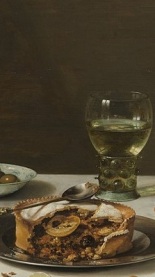 The master, our mistress and their friends went at the wine with a will.
The master, our mistress and their friends went at the wine with a will.
What a day they’d had! Linkin and I ate morsels of pie while their words flew back and forth.
We could not take all in, but I will set down what we learnt to the best of my remembrance.
Essex’s high good humour. His fine attire – a black satin suit and a velvet gown.
My Earl seemed sad, but not dismayed. A suit of dark stuff, and a cloth gown with long sleeves to keep his paws hid.
Essex arrkst if they might challenge any of the Peers that would sit in judgement on them. As common men can, when they’re brought to trial.
The answer was No. Because Peers are honorable.
Then that fool Lord Grey was called. Essex laughed and nudged my Earl.
What a spectacle Lord Grey later made! When Essex spake of his enemies and Lord Grey’s assalt on my Earl, he leapt up to defend hisself. There were sharp words betwixt him and my Earl.
Another fool among the Peers also took exceptions with something Essex sayt, but was not permit to dispute with him.
The best spectacle came when the Cook pressed Essex to say why he claimed the State was sold to Spain.

Essex replied that he’d come to defend hisself, not accuse others. But he’d heard from a Councillor that Sir Rabbit sayt the Infanta of Spain had the best claim to the crown.
How ’mazed all were when Sir Rabbit [Sir Robert Cecil] sprang forth from behind a wall-hanging where he’d been hid.
He begged leave to speak. After praise of hisself and unkindness to Essex, he demanded that this Councillor be named.
Essex sayt Lord Southampton could name him, too. Though they were not sure if it were proper to do so.
Sir Rabbit told my Earl to remember the friendship that was once between them, and name the Councillor. “Else,” sayt he, “I will know you to be as impudent a traitor as he that stands there with you.” (Or so our mistress believed she heard him say.)

My Earl whispered with Essex.
Sir Rabbit objected to their talking together, saying they done too much of that alreadie.
Then my Earl named a man, whose name I forget.
He, being sent for, told of a book which sayt the Infanta’s claim was best. Sir Rabbit had offered to show him this book, but had not spake those words.
His answer did harm to none, and may have done my Earl some good. Or so our mistress hoped.
But who could believe my Earl’s defense? Viz:
Our meetings at Drury House could not be accounted treason because they led to nowt. (Scabface, who went to White-Hall, would have been grieved to hear that.)
My Earl went to Essex House because his friend was like to be murdered.
He had 10 or 12 of his followers with him – no more than usual.
He was not armed, save for his sword and dagger.
He hadn’t heard anyone make threats against the gentlemen sent by the Queen. (Onix did.)
He’d accompanied Essex into the citie to protect him from his private enemies.
He’d not heard the Proclamation of Treason – he was in another street.
He’d sought to stop the shooting from Essex House. He’d urged surrender. (A thing Essex sayt was true.)
After the Peers gave their verdick, the Earls were arrkst if they had anything to say before judgement was passed upon them.

Essex, bold to the last, would not plead for his life, but affirmed his innocencie of the charges laid against him.
My Earl sayt his ignorance of the law made him incur the danger of it, but he’d served Her Majestie well and spent most of his money in her service. He trusted in her mercie.
The master’s sweetheart sayt she could have wept when the sentence of death was pronounced. As many did.
She pitied my Earl. He having such pretty blue eyes, and being guilty of nowt but love and loyalty for his friend.
“But could he have been so ignorant of the law?” arrkst our mistress. “Or deaf and blind to so much of what passed that day?”
I might have told them my Earl was as deaf and blind as I am, but – being loyal – I forbore.
 The guilty verdict and death sentences were inevitable.
The guilty verdict and death sentences were inevitable.
At trial, the old arguments were trotted out. The prosecution’s case was that Essex sought to depose the Queen and take the throne himself. Essex countered that his life was threatened and he sought an audience with the Queen.
The Earl of Southampton was tried as Essex’s chief aide. He’d been the lead plotter at Drury House, he was present when the Queen’s officials were detained, and he’d entered the city and returned to Essex House afterwards.
The trial sounds as dramatic as anything the spectators would have seen on stage. Two glamorous young Earls as defendants, two of England’s best legal brains prosecuting, a jury member arguing with a defendant…
Sir Robert Cecil’s sudden appearance from behind the arras must have startled (or excited) everybody.

There were 8 judges to provide legal advice to the peers sitting in judgement. Lord Chief Justice Popham also gave evidence because he was one of the officials who’d been held in Essex House.
There were 25 peers: 9 earls, 1 viscount, and 15 barons. Most were enemies or friends of Essex. In the tiny sphere of the aristocracy a completely neutral jury would have been impossible, but Lord Grey was a bad choice.
Essex’s brother-in-law, Lord Rich, was also a juror. How well disposed he still was to Essex is anybody’s guess.
The French ambassador, or someone who signed a malicious letter in his name, was particularly rude about the jury of peers, saying they returned their verdict well-addled, having been smoking, and stuffing themselves with delicacies and beer.
Another letter writer, John Chamberlain, thought both Earls spoke well, but Southampton was too submissive.
Southampton’s defense strikes me as typical of someone trying to extricate himself from a dire situation without landing anybody else in it. Didn’t do much, saw and heard even less.
Tricks wasn’t convinced, but…
Such a veritable mess of a disaster… 😦
LikeLiked by 1 person
That’s one trial I would really like to have seen.
LikeLiked by 1 person
I wonder if Southampton thought he had a chance of saving his life, or if Essex told him to equivocate. Either way, he probably thought he had nothing to lose and everything to gain.
LikeLiked by 1 person
I think you’re right on both counts. Accounts of the trial differ a lot, but there’s a detailed report by an anonymous writer printed In H. Stephen’s ‘State Trials: Political and Social’ that also contains observations of what we would call body language, and lively snippets of dialogue.
Essex knew he was a goner, but there’s no indication in the report that he wasn’t comfortable with Southampton’s line of defense. Of course, Essex would have wanted to make as favourable impression as he could in his last public appearance.
LikeLiked by 1 person
Yes, Essex does seem to come out of the trial rather well.
LikeLiked by 1 person
I wonder if there has ever been such a thing as a fair trial — unless exclusively for blondes, that is.
LikeLiked by 1 person
If you’re the defendant, the fair trial is the one you walk away from.
LikeLiked by 3 people
It does seem that all too often a trial (or confirmation hearing) are more about those who are in power and less about the character and intent of those being tried. It has been ever so.
LikeLiked by 1 person
True – though I think even a really good defense lawyer would have been hard put to get these two off. Their real undoing would have been the plotting that went on at Drury House and the discussions about capturing the Tower and Whitehall Palace.
Saying that they meant no harm to the Queen and anyway, nothing had come of those plots wasn’t much of a defense.
LikeLike
Reminds me of judgement from Scent Of A Woman. Such feelings and loyalties questioned and proven for naught. 😎🥀
A jury of more than 12 peers!? How just are those numbers!?
LikeLiked by 1 person
25 is an extraordinary number – I don’t know why so many were necessary. Perhaps it was a matter of protocol? Even at that time twelve was the number for ordinary folk.
LikeLike
I felt an almost overpowering urge to comment on current events in the USA after reading about this trial. But I overpowered that urge.
LikeLiked by 1 person
A wise decision.
LikeLiked by 1 person
Having just read a 54 page transcript of the trial (in The Folio Society’s Notable Historical Trials vol 1) I commend you on your achievement in capturing the essence of the trial so vividly. I do hope that Tricks makes it to the execution.
LikeLiked by 1 person
I don’t think Tricks is sure enough of her own safety to risk going near the Tower. Picker and Stealer headed in that direction a while ago, so they’ll be looking forward to the execution.
Who was the transcript you’ve just read attributed to/edited by, Claudio?
LikeLike
The 4 volumes of trials starting with the trial of Socrates in 399 BC and ending with Oscar Wilde’s trial in 1895 are edited by Justin Lovill. Great for dipping into.
LikeLiked by 1 person
Thanks!
LikeLike
I’m having a weekend catching up with my blogging world and recent posts by my favourite bloggers. As always, I have thoroughly enjoyed the last few of yours – which I had been saving until I had time to do them justice. I have said it before but I enjoy the historical notes at the end every bit as much as the main story – in fact, I sometimes read them first! Fantastic research, presented in an original and creative way. And I’m not even a cat-lover (only because I’m extremely allergic to them and so have a tainted view of them). Is this going to be published as a book one day?
LikeLiked by 1 person
Thanks! As for a book – I really don’t know. I’m not sure that I’d have the necessary time and the stamina.
LikeLike
Be wary of those in high places as “Absolute power corrupts absolutely”. Colette, Simone and the human
http://lesdeuxdivasmavieenrose.wordpress.com
LikeLiked by 1 person
As far as cats are concerned, high places are reserved for them to sit in.
LikeLiked by 1 person
Without a doubt and nature, protected not exploited.
LikeLiked by 1 person